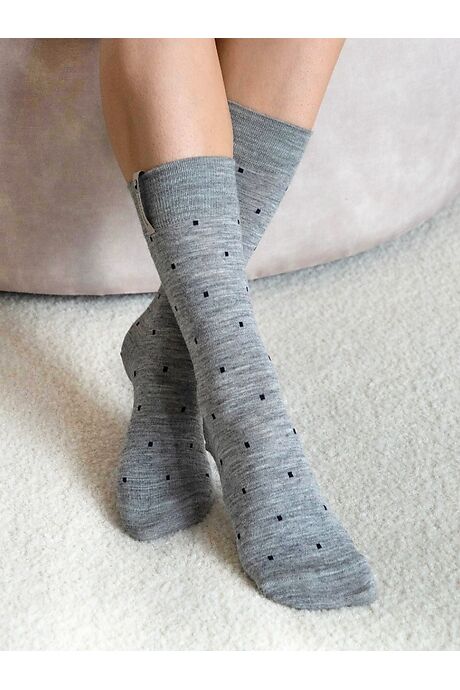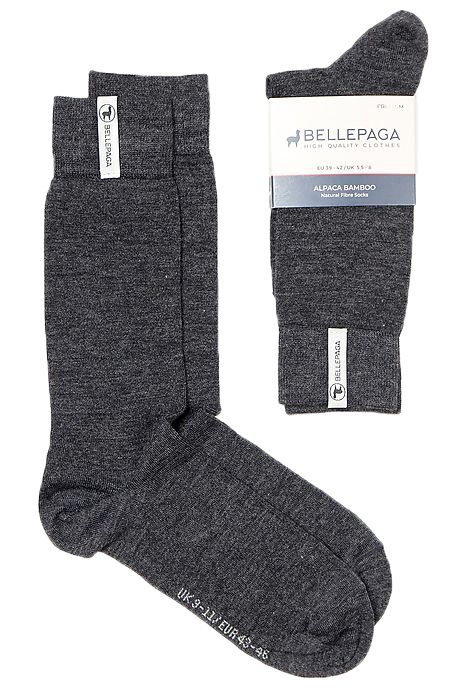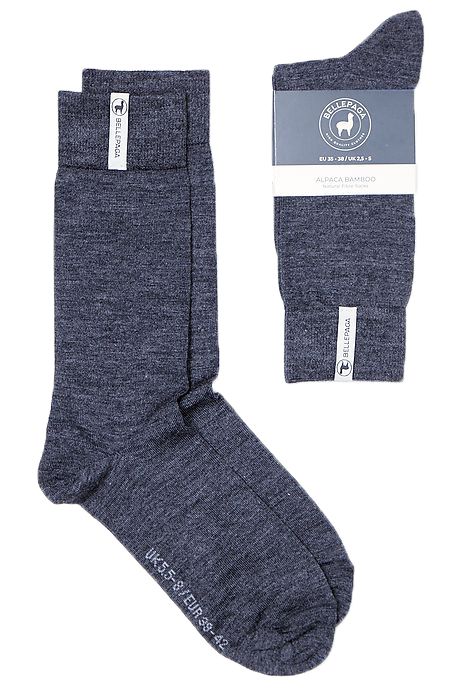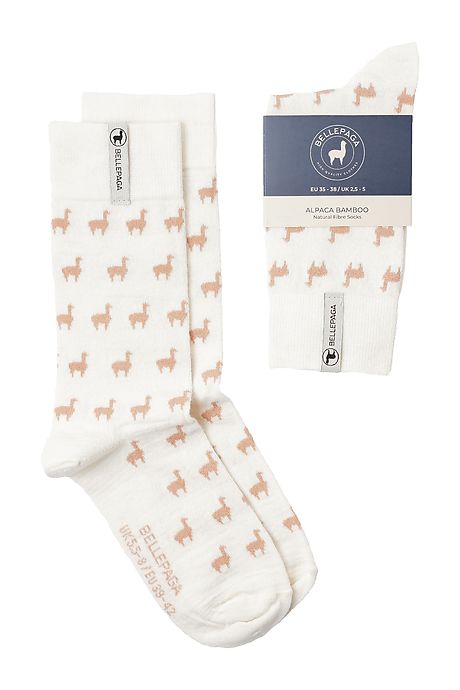Ethical socks
Socks, an essential in our daily life. Simple, fancy or elegant, there is a multitude of socks for a multitude of styles! But do you know what is in your socks? Cotton, wool, ... there are also many possibilities. But why not opt for ethical and eco-responsible socks? With the times, ethical socks are more and more requested but are not very common. So why not opt for ethical socks made of alpaca wool? In this article we will explain how to choose your ethical socks with confidence. You will see, you will not regret it.
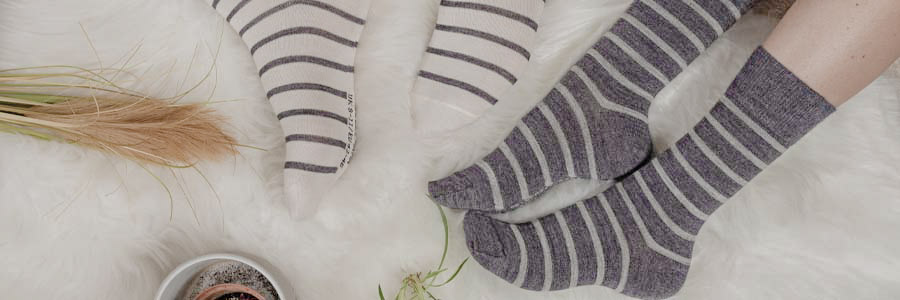
In order to better understand what ethical socks are, we will see how ethics is defined. First of all, the word "ethics" comes from the Greek "ethos" meaning "way of life". To be more precise, it is a philosophy that deals with the behavior of Man and his conduct in society. Nowadays, ethics is defined as a set of moral conceptions of someone or of a community. When we say that something is ethical, like an object for example, it means that it integrates moral criteria in its functioning, design and marketing. Ethics has many values, the most known and important of which are: respect, responsibility, integrity, fairness and honesty. These values must be taken into account in the process of creating and marketing the product.
In the same way for the brands calling themselves "ethical", it is important that they respect many things such as the respect of the environment and the workers, that it is a measured consumption, that it uses materials of qualities and that it pays attention to the country where it produces its products. However, we must be very careful, some brands claim to be ethical and eco-responsible when in reality it is only a facade to attract customers concerned about their purchases and the planet. We call this greenwashing, and we must beware of it! Green logo or graphic charter, slogan talking about environment, etc. Don't be fooled. You have to be very careful about the country of manufacture as well as the materials used for the design of the products, so make sure you read it carefully!
But then, how do I know if my socks are ethical? First of all, look at the label, if the composition of your socks is made of organic, ecological and noble materials like wool, cotton or linen. Then there is a good chance that they are ethical. However, you have to check the country of origin of your socks: if your socks come from the European Union, then no worries, your socks are ethical! Many European standards are there to govern a healthy, ethical and environmentally responsible production. But that's not all, if your socks come from another country it doesn't mean that they are not ethical. You must pay attention to the manufacturing conditions, if they are made under fair trade conditions then your socks will be ethical.
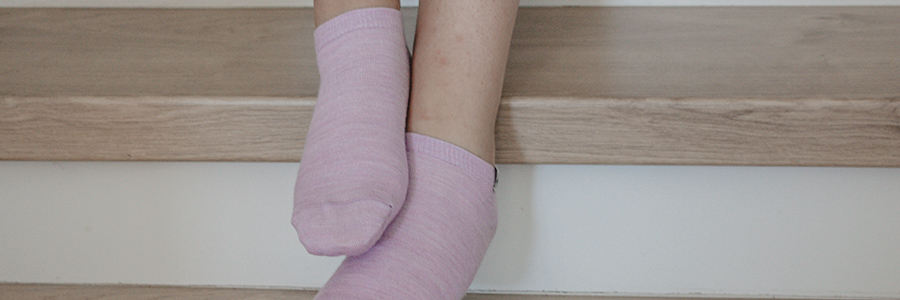
As with ethics, we will also define the notion of eco-responsibility. Indeed, this notion is complementary to ethics. It is defined as the adoption of regular actions that allow us to limit our ecological footprint and our impact on the environment. Here again, individuals, companies and other organizations are directly impacted and concerned by ecoresponsibility.
But what is an eco-responsible product? An eco-responsible product is a product that has a low impact on the environment throughout its life cycle, more precisely from the extraction of its raw materials, its design, its transport, its sale, its use and its recycling.
But here again, how do I know if my socks are eco-responsible? It's simple, as for ethical socks, you just have to look at the materials used, if they are ecological it's great. And it is important to check the place of manufacture and the conditions of manufacture.
Little extra: look at the labels! Many labels exist, prefer those of the eco-responsible fashion. Here too you will find everything on the label of your product. If you want to know more, don't hesitate to ask about the label in question.
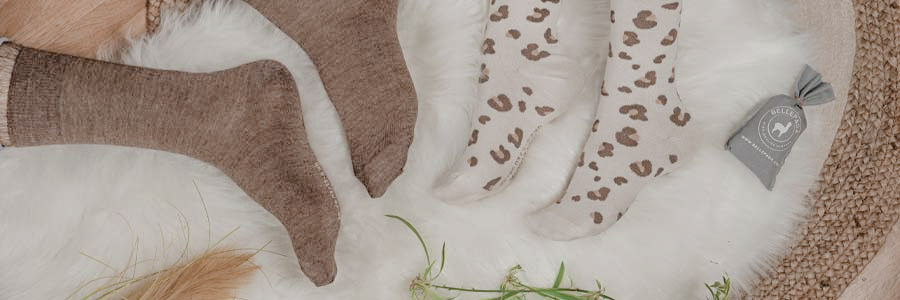
You are cold, you often have frozen feet and you are looking for ethical wool socks? We will guide you. First of all, define which wool you want to adopt. You don't know? Don't worry, we'll explain it all to you.
First of all, wool is a particular form of each species of mammal hair, in some of them a fleece is formed to protect the animal from various weather. The most known are the wools of sheep or goat because they regularly and easily provide wool, but they are not the most prestigious wools in the manufacture of clothing.
Sheep's wool: Very used, sheep's wool is collected every spring. It is warm and comfortable but not thermoregulatory.
Merino wool : It comes from the wool of the merino sheep, native to the highlands of New Zealand and Australia. Finer than the classic sheep's wool, it pills little and shrinks less. It also has the particularity of not itching when in contact with the skin and wicks moisture well. The washing must be done by hand with cold water, and the use of special wool detergent is necessary.
Cashmere wool: Cashmere comes from the animal fiber, the long and silky undercoat of cashmere goats. This wool is considered the most luxurious type of wool. Indeed, this wool is extremely fine, it is also more resistant than sheep wool, it is light, silky and durable. Its price is certainly very expensive, but not without reason. Indeed, cashmere is very rare, on average 80 grams are harvested per sheep each year.
The mohair wool: The mohair wool comes from the angora goat, native of the Tibetan region. Again, mohair is known for its insulating properties, its lightness and its softness. However, the mohair fiber is quite thick, so it may scratch you.
Angora: Angora fiber comes from the angora rabbit, moreover this fiber is hollow, which means that it offers excellent insulation even if it is fluffy and light. However, in order to harvest the angora wool, France waits for the animal's moulting period, unlike China, which rips off the entire fleece. So pay attention to the origin of the wool, especially when we know that the world production of angora comes to 90% from China! So animal abuse: no.
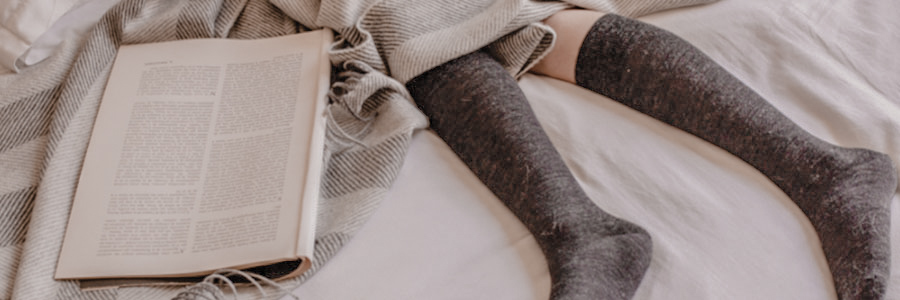
And why not opt for ethical socks in alpaca wool? Yes yes, you are not dreaming of alpaca! A very noble fiber, and incredibly soft. You do not know the alpaca and its wool so exceptional? We will enlighten you.
The alpaca is a camelid cousin of the llama. Despite their great resemblance, these animals are not used by man in the same way. The llama, because of its size and strength, is used to carry heavy loads in South America. While the alpaca is used for its wool.
But where do they live? In the Andes Mountains, high mountain plateaus where temperatures vary from one extreme to another every day.
But how do they survive all these temperature changes? Thanks to their wool! It is incredibly warm but also thermoregulatory. That is to say that when it is more than 30 degrees they will never be too hot and when the temperatures go into the negative range they are never cold! Incredible, isn't it? That's why we love alpaca wool so much, but that's not all!
Alpaca wool is known for its many virtues. As I said before it is soft, silky, thermoregulatory and very warm. It is also hypoallergenic and does not itch. Do you sweat? Don't worry, alpaca wool has no smell when wet (perfect for ethical socks, no?). Say goodbye to foot odor after a long day...). And that's not all! Alpaca wool is also very resistant, meaning it doesn't get damaged quickly and doesn't pilling. They will last you over time so no need to throw them away and buy new ones every 3 months. It's a more ethical and eco-responsible way of consuming.
But why are our socks ethical and eco-responsible? First of all our ethical socks are made of alpaca wool. Apart from all the virtues already mentioned, the alpaca is also a very ecological animal (yes, you are not dreaming). Indeed, it consumes very little water and food, and especially it does not uproot the plants it eats, they cut them, unlike sheep or goats. Our ethical alpaca wool socks are made in Peru, where our dear alpacas live. That is to say that they live in their natural environment and in freedom all along their life and are sheared only once a year. Speaking of shearing, between 2 and 3kg of wool are harvested each year per alpaca. This is much more than cashmere and much more respectful for the animal than the hair pulling that angora rabbits undergo. Alpaca fiber is available in about 20 natural shades that do not require any dyeing. The same goes for chemical treatments, which unlike other wools, here is not necessary.
The manufacture of our ethical socks are made by Peruvian craftsmen. Indeed, we are amazed by their ancestral know-how and we respect their work. We take care of the well-being of each craftsman as well as the fair redistribution of each worker who makes our articles.
To conclude, choosing your socks requires many variables. To find the best pair of ethical socks, read the product label carefully. However, at BellePaga we are committed to an exceptional experience of comfort and tenderness for your ethical alpaca wool socks. We take care to respect animals, the environment and workers in every product we design. What if you tried it?

What are ethical socks?
In order to better understand what ethical socks are, we will see how ethics is defined. First of all, the word "ethics" comes from the Greek "ethos" meaning "way of life". To be more precise, it is a philosophy that deals with the behavior of Man and his conduct in society. Nowadays, ethics is defined as a set of moral conceptions of someone or of a community. When we say that something is ethical, like an object for example, it means that it integrates moral criteria in its functioning, design and marketing. Ethics has many values, the most known and important of which are: respect, responsibility, integrity, fairness and honesty. These values must be taken into account in the process of creating and marketing the product.
In the same way for the brands calling themselves "ethical", it is important that they respect many things such as the respect of the environment and the workers, that it is a measured consumption, that it uses materials of qualities and that it pays attention to the country where it produces its products. However, we must be very careful, some brands claim to be ethical and eco-responsible when in reality it is only a facade to attract customers concerned about their purchases and the planet. We call this greenwashing, and we must beware of it! Green logo or graphic charter, slogan talking about environment, etc. Don't be fooled. You have to be very careful about the country of manufacture as well as the materials used for the design of the products, so make sure you read it carefully!
But then, how do I know if my socks are ethical? First of all, look at the label, if the composition of your socks is made of organic, ecological and noble materials like wool, cotton or linen. Then there is a good chance that they are ethical. However, you have to check the country of origin of your socks: if your socks come from the European Union, then no worries, your socks are ethical! Many European standards are there to govern a healthy, ethical and environmentally responsible production. But that's not all, if your socks come from another country it doesn't mean that they are not ethical. You must pay attention to the manufacturing conditions, if they are made under fair trade conditions then your socks will be ethical.

Eco-responsible socks
As with ethics, we will also define the notion of eco-responsibility. Indeed, this notion is complementary to ethics. It is defined as the adoption of regular actions that allow us to limit our ecological footprint and our impact on the environment. Here again, individuals, companies and other organizations are directly impacted and concerned by ecoresponsibility.
But what is an eco-responsible product? An eco-responsible product is a product that has a low impact on the environment throughout its life cycle, more precisely from the extraction of its raw materials, its design, its transport, its sale, its use and its recycling.
But here again, how do I know if my socks are eco-responsible? It's simple, as for ethical socks, you just have to look at the materials used, if they are ecological it's great. And it is important to check the place of manufacture and the conditions of manufacture.
Little extra: look at the labels! Many labels exist, prefer those of the eco-responsible fashion. Here too you will find everything on the label of your product. If you want to know more, don't hesitate to ask about the label in question.

Wool socks
You are cold, you often have frozen feet and you are looking for ethical wool socks? We will guide you. First of all, define which wool you want to adopt. You don't know? Don't worry, we'll explain it all to you.
First of all, wool is a particular form of each species of mammal hair, in some of them a fleece is formed to protect the animal from various weather. The most known are the wools of sheep or goat because they regularly and easily provide wool, but they are not the most prestigious wools in the manufacture of clothing.
Sheep's wool: Very used, sheep's wool is collected every spring. It is warm and comfortable but not thermoregulatory.
Merino wool : It comes from the wool of the merino sheep, native to the highlands of New Zealand and Australia. Finer than the classic sheep's wool, it pills little and shrinks less. It also has the particularity of not itching when in contact with the skin and wicks moisture well. The washing must be done by hand with cold water, and the use of special wool detergent is necessary.
Cashmere wool: Cashmere comes from the animal fiber, the long and silky undercoat of cashmere goats. This wool is considered the most luxurious type of wool. Indeed, this wool is extremely fine, it is also more resistant than sheep wool, it is light, silky and durable. Its price is certainly very expensive, but not without reason. Indeed, cashmere is very rare, on average 80 grams are harvested per sheep each year.
The mohair wool: The mohair wool comes from the angora goat, native of the Tibetan region. Again, mohair is known for its insulating properties, its lightness and its softness. However, the mohair fiber is quite thick, so it may scratch you.
Angora: Angora fiber comes from the angora rabbit, moreover this fiber is hollow, which means that it offers excellent insulation even if it is fluffy and light. However, in order to harvest the angora wool, France waits for the animal's moulting period, unlike China, which rips off the entire fleece. So pay attention to the origin of the wool, especially when we know that the world production of angora comes to 90% from China! So animal abuse: no.

Alpaca wool socks
And why not opt for ethical socks in alpaca wool? Yes yes, you are not dreaming of alpaca! A very noble fiber, and incredibly soft. You do not know the alpaca and its wool so exceptional? We will enlighten you.
The alpaca is a camelid cousin of the llama. Despite their great resemblance, these animals are not used by man in the same way. The llama, because of its size and strength, is used to carry heavy loads in South America. While the alpaca is used for its wool.
But where do they live? In the Andes Mountains, high mountain plateaus where temperatures vary from one extreme to another every day.
But how do they survive all these temperature changes? Thanks to their wool! It is incredibly warm but also thermoregulatory. That is to say that when it is more than 30 degrees they will never be too hot and when the temperatures go into the negative range they are never cold! Incredible, isn't it? That's why we love alpaca wool so much, but that's not all!
Alpaca wool is known for its many virtues. As I said before it is soft, silky, thermoregulatory and very warm. It is also hypoallergenic and does not itch. Do you sweat? Don't worry, alpaca wool has no smell when wet (perfect for ethical socks, no?). Say goodbye to foot odor after a long day...). And that's not all! Alpaca wool is also very resistant, meaning it doesn't get damaged quickly and doesn't pilling. They will last you over time so no need to throw them away and buy new ones every 3 months. It's a more ethical and eco-responsible way of consuming.
But why are our socks ethical and eco-responsible? First of all our ethical socks are made of alpaca wool. Apart from all the virtues already mentioned, the alpaca is also a very ecological animal (yes, you are not dreaming). Indeed, it consumes very little water and food, and especially it does not uproot the plants it eats, they cut them, unlike sheep or goats. Our ethical alpaca wool socks are made in Peru, where our dear alpacas live. That is to say that they live in their natural environment and in freedom all along their life and are sheared only once a year. Speaking of shearing, between 2 and 3kg of wool are harvested each year per alpaca. This is much more than cashmere and much more respectful for the animal than the hair pulling that angora rabbits undergo. Alpaca fiber is available in about 20 natural shades that do not require any dyeing. The same goes for chemical treatments, which unlike other wools, here is not necessary.
The manufacture of our ethical socks are made by Peruvian craftsmen. Indeed, we are amazed by their ancestral know-how and we respect their work. We take care of the well-being of each craftsman as well as the fair redistribution of each worker who makes our articles.
To conclude, choosing your socks requires many variables. To find the best pair of ethical socks, read the product label carefully. However, at BellePaga we are committed to an exceptional experience of comfort and tenderness for your ethical alpaca wool socks. We take care to respect animals, the environment and workers in every product we design. What if you tried it?
-
Muju Socks - Classic
- 35 - 38
- 39 - 42
- 43 - 46
23,90 €
-
Sami Premium Socks - Classic
- 35 - 38
- 39 - 42
- 43 - 46
29,90 €
-
Incas Socks - Classic
- 35 - 38
- 39 - 42
- 43 - 46
23,90 €
-
Yupa Socks - Classic
- 35 - 38
- 39 - 42
- 43 - 46
23,90 €
-
Sami Premium Socks - Classic
- 35 - 38
- 39 - 42
- 43 - 46
29,90 €

